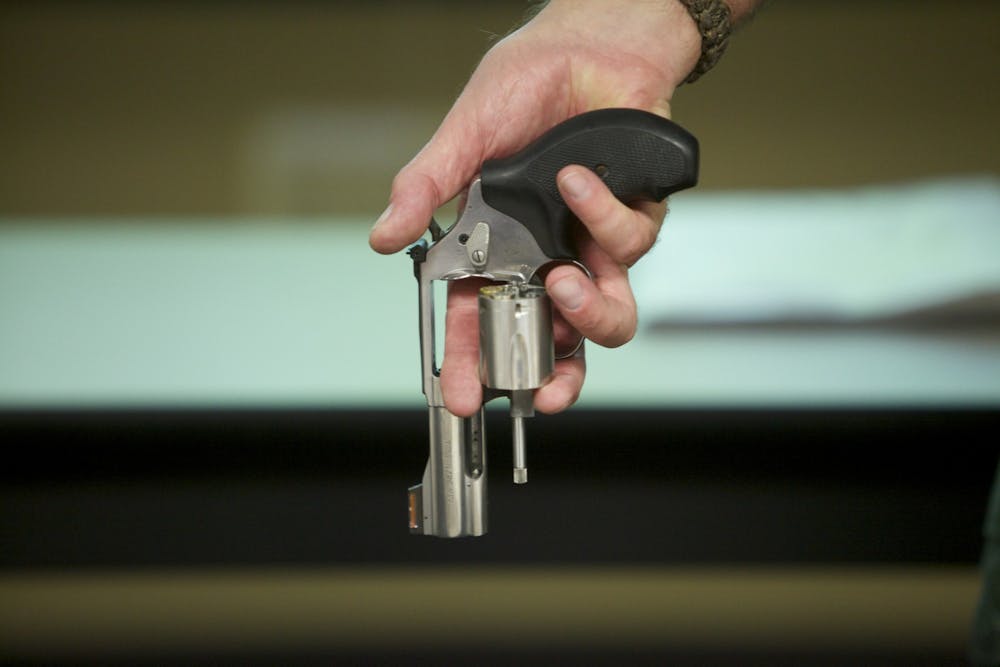As a senior in high school when the Parkland shooting happened, I was one of the leading members of my high school’s March for Our Lives walkout and trip to Washington, D.C., for the rally. I strongly support common sense gun control legislation and am at least a little scared of guns.
After armed white supremacists started marching with their guns out more and more, the desire to own a gun wouldn’t leave my head, no matter how unthinkable and heretical that desire felt based on the convictions I had developed as I finished high school.
I still have that itch, and I still feel a little guilty about it. I haven’t acted upon it, partially because I haven’t figured out how to purchase a gun and learn how to use it without giving money to the National Rifle Association and partially because I know that individual self-defense is largely a myth.
But that defensive itch grows harder to ignore when I see harbingers of political violence, such as Ku Klux Klan recruiting material in Bloomington. Other liberals seeing blatant displays of white supremacy, like white power graffiti and swastikas, are in the same boat.
People who support gun control but also want a gun often feel like hypocrites. They aren’t. March for Our Lives, for example, advocates a high standard for gun ownership, with a licensing system comparable to cars, more rigorous background checks and bans on what they call “weapons of war.”
There are other proposals on their platform that aim to reduce the number of guns owned, and I am not claiming that many members of March for Our Lives wouldn’t prefer the total abolition of gun ownership. The bottom line, though, is that gun owners and prospective gun owners can support all of those goals.
On the other hand, there are many well-documented myths about armed self-defense. Owning a gun makes you more, not less, likely to experience gun violence. The “good guy with a gun” is rarely able to stop the “bad guy with a gun.”
Some people, regardless of their politics, still feel safer with a gun around. “We all know the statistics that guns don’t make us safer," psychologist Daniel Levitin wrote for the New York Times. "But we fool ourselves into thinking that those statistics don’t apply to us… we reach for guns because if there is a confrontation, we don’t want to be unprepared and we think we will beat the odds.”
Many people know, statistically, that their gun will either never be needed for self-defense or that it might actually make matters worse. I don’t know whether they — or, more honestly, we — should pursue illogical but emotionally satisfying peace of mind anyway.
Individual self-defense is largely a fallacy. Collective self-defense is a different conversation altogether. First, it seems to be what the Second Amendment actually has in mind in its reference to a “well-regulated militia.” Second, it often requires a level of training and competence from its members that individual self-defense does not.
Think about the Black Panther Party. Huey P. Newton and other founding members knew their rights inside-out, including their gun rights. They knew that the police were not there to protect the black community and were, in fact, there to do them harm. And they knew that if they armed themselves, which was within their legal rights, they could protect their community.
Their effectiveness led conservative hero Ronald Reagan to sign the Mulford Act into law as governor of California. As evidenced in this case, gun control victories sometimes result from racist motives and the desire to disarm black people and other communities of color.
While the Black Panther Party and its famous copwatching and social service programs no longer exist, antifascist and antiracist collective self-defense groups from the Socialist Rifle Association to Redneck Revolt have been springing up in recent years. This is especially true in the Pacific Northwest, where antifascists and white supremacists clash in the streets with a regularity that would shock much of the rest of our country.
It might not be unreasonable for liberals and leftists to fear political violence given our current moment, especially if they sit down and do the math about who owns most of the guns in this country. Perhaps it’s time to think about collective self-defense and to grapple with the realities of our age. As many Spanish antifascists would tell us as we grapple with what to do about a heretical desire for arms: better Vienna than Berlin.
Are they right? I don’t know. Add that to my list. But let’s all be a little bit more nuanced when we talk about guns.
Kaitlyn Radde (she/her) is a rising junior studying political science. She plans to pursue a career in public interest law.





